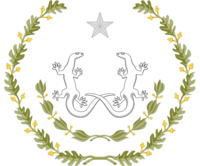Foreign relations of Anáhuac
This article is incomplete because it is pending further input from participants, or it is a work-in-progress by one author. Please comment on this article's talk page to share your input, comments and questions. Note: To contribute to this article, you may need to seek help from the author(s) of this page. |
{{Sidebar with collapsible lists | name = Politics of Anáhuac | bodyclass = vcard | wraplinks = true | expanded = | headingstyle = padding-top:0;text-align:left;padding-bottom:0.5em; | liststyle = padding-top:0;text-align:left; |listtitlestyle = text-align:left; background:lavender;
| title =
 This article is part of a series on the
This article is part of a series on the
politics and government of
Anáhuac
| list1title = Federal government | list1 =
| list2title = Executive | list2 =
| list3title = Legislature | list3 =
| list4title = [[Judiciary | list4 =
| list5title = Elections | list5 =
- Recent major elections
General: 2002, 2010 and 2018
Legislative: 2006, 2012, 2018 and 2024
Gubernatorial: 2010 and 2021
| list6title = | list6style = text-align:center;
| list6 =
| list7title = Administrative divisions | list7 =
| list8name = Foreign | list8title = Foreign relations | list8 =
|list9name= Other |list9title = Key figures |list9 =
}}
The foreign relations of Anáhuac are directed by the President of the Republic and managed through the Ministry of Foreign Affairs. The principles of the foreign policy are constitutionally recognized in the Article 89, Section 10, which include: respect for international law and legal equality of states, their sovereignty and independence, non-intervention in the domestic affairs of other countries, peaceful resolution of conflicts, and promotion of collective security through active participation in international organizations. Until its abolition in 2023, the Khan Doctrine has served as a crucial complement to these principles.